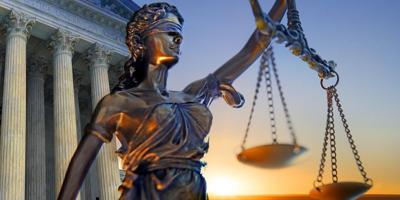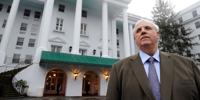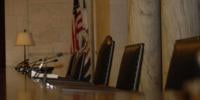
CHARLESTON – A federal judge has referred an assistant attorney general to the state Lawyer Disciplinary Board for alleged misrepresentations in a case.
In an August 25 memorandum opinion and order, U.S. District Judge Thomas E. Johnston ordered Gail Lipscomb to be referred to the LDB and the West Virginia State Bar.
Johnston also found Jonathan Frame, superintendent of the Mount Olive Correctional Complex, and state Department of Health Facilities Secretary Michael Caruso in civil contempt for defying an earlier order to transfer inmate Keith Lowe to a psychiatric hospital. The judge said Lipscomb assisted Caruso and Frame in avoiding the court order to transfer Lowe, who has a history of suicidal tendencies.
Lowe, who had been held in solitary confinement for more than a dozen years, attempted suicide in April. He asked to be transferred to William R. Sharpe Hospital in Weston, and Johnston granted that request in May. But Lowe remains at Mount Olive. The state did transfer him to Mount Olive’s mental health unit a few days later, and a hearing was held in Fayette County before Mental Hygiene Commissioner Evan Dove.
Frame took part in the hearing remotely, and Lipscomb was at the hearing.
“Apparently, it was unclear to pretty much everyone what attorney Lipscomb was doing at this hearing,” Johnston wrote in Monday’s order. “Attorney Lipscomb claimed that she ‘appeared at the probable cause hearing’ on behalf of Sharpe Hospital and the West Virginia Department of Health Facilities.
“Defendant Frame largely corroborated that claim at the contempt hearing, stating that he knew attorney Lipscomb was present but did not know if she was representing him. However, Commissioner Dove believed attorney Lipscomb was representing defendant Frame. This confusion on his part was corroborated by the fact that Commissioner Dove repeatedly referred to attorney Lipscomb as counsel for the applicant, defendant Frame, during the probable cause hearing.
“At no point did defendant or attorney Lipscomb object to that characterization.”
Lowe asked to waive the hearing so he could be committed, but Lipscomb wanted the hearing to continue to challenge the involuntary commitment. During the hearing, Johnston wrote, Lipscomb said Lowe could be adequately treated at Mount Olive and asked Dove to not commit Lowe to Sharpe Hospital. Dove agreed, issuing an order keeping Lowe at Mount Olive and gave the state two weeks to find a facility to meet Lowe’s security needs.
During a June 5 status conference, Lipscomb told Johnston that Frame and the state had not opposed Lowe’s transfer to Sharpe, saying state rules wouldn’t allow the transfer.
“She (Lipscomb) left this court with the impression that plaintiff needed to be evaluated by Sharpe Hospital in order to be admitted, and that such evaluation could not occur because he was not admitted into Sharpe Hospital,” Johnston wrote. “Logically, this was somewhere between a conundrum and a studied impossibility.”
The state did begin the process of moving Lowe to a federal medical facility in Missouri. That move should happen around September 10, according to Johnston’s order. But on July 7, Lowe again attempted suicide at Mount Olive with a dull razor.
Johnston said Mount Olive failing to place a razor restriction on Lowe was “mystifying” and “shocking.”
“That seems to fly in the face of the concerns for self-harm that prompted the move in the first place,” Johnston wrote. “This circumstance sinks Mount Olive’s argument that it can properly treat plaintiff, not least because the record developed at the preliminary injunction hearing indicated that plaintiff previously attempted suicide with a razor.”
In his order, Johnston said Caruso and Frame were bound by the preliminary injunction to transfer Lowe to a state psychiatric facility. He also said Lipscomb’s actions were meant to provide cover for Frame.
“It is apparent that Commissioner Dove was misled to believe attorney Lipscomb was ‘counsel for the applicant (Frame),” Johnston wrote. “That characterization was corroborated by Commissioner Dove’s testimony at the contempt hearing where he stated that attorney Lipscomb was counsel on behalf of defendant Frame at the proceeding before him.”
A footnote of the order says Dove asked Lipscomb directly if something she said during the hearing was “on the basis of representation of Mr. Frame or … legal representation of William R. Sharpe?” Lipscomb said “those were two different things,” but that “their interests were aligned.”
“She could have simply denied representing defendant Frame at this time,” Johnston wrote. “Her failure to do so speaks to the duplicitous nature of her representation at that hearing.”
Johnston continued.
“Defendant Frame and attorney Lipscomb had ample opportunity to advise Commissioner Dove of the true nature of attorney Lipscomb’s representation,” he wrote. “Their failure to do so appears to be a calculated strategy on their part to deceive both Commissioner Dove and this court.
“The distortion about the nature of attorney Lipscomb’s representation is important for this proceeding because it highlights the steps defendant Frame took to circumvent this court’s order. …
“Attorney Lipscomb’s appearance at the probable cause hearing was a blatant attempt to give plausible deniability to defendant Frame. By making the arguments she made alongside defendant Frame, both he and WVDHF attempted to portray his own violations of the preliminary injunction as the independent actions of WVDHF. …
“(Frame) and the other defendants, took a deliberate course of action to get a state order that contradicted this court’s order. In doing so, they have knowingly violated this court’s order.”
In his order, Johnston also said Lipscomb filed an Errata Notice in the case to inform the court of “inaccuracies” in Caruso’s brief. In it, she identified two transgressions that Johnston called false.
“Throughout 33 years in the law and nearly 20 years on the bench, this court has never before seen such a filing,” Johnston wrote. “Both false statements offered to this court were apparently made based on attorney Lipscomb’s ‘own recollection’ of the probable cause hearing, and were not made to ‘mislead or misrepresent the court with any inaccurate facts.’ Attorney Lipscomb then ‘apologize(d) to the court and parties.’”
Johnston called those excuses unacceptable.
“Given everything that has happened in this case, from the probable cause hearing through the contempt hearing, attorney Lipscomb has given the court no reason to believe these misrepresentations were merely mistakes,” Johnston wrote. “Instead, it represents a pattern for attorney Lipscomb. She attempts to present things in a murky light so that the tribunals she is before cannot tell what the truth really is.
“She stated to this court that she merely represented WVDHF at the probable cause hearing when, in reality, Commissioner Dove accepted her representing defendant Frame. She had the opportunity to explain to the court and the parties at the June 5, 2025, status conference what was happening with plaintiff’s commitment. Instead, she chose to blame Kafkaesque procedures as the obstacle to having plaintiff committed.
“In reality, she and defendant Frame were the obstacle. She could have been forthright in her briefs about the mistakes she made throughout the case. Instead, she chose to compound those mistakes with falsehoods, and only sought forgiveness once she was caught.”
Johnston doesn’t think Lipscomb simply misremembered things, saying she instead tried to mislead and misrepresent events.
“Did attorney Lipscomb honestly believe the truth was never going to come out?” Johnston wrote. “Apparently so. Only she and defendant Frame were at the probable cause hearing. Without the recording of the probable cause hearing, the court – and probably plaintiff’s counsel – would never have known of the violation of this court’s order and attorney Lipscomb’s duplicity.”
Johnston said Lipscomb’s actions “created chaos for everyone.”
“If she were forthright about why the mental hygiene process was insufficient, plaintiff’s attorneys could have quickly responded to that,” he wrote. “Instead, it took months to uncover the truth. Further, she enabled defendant Frame to engage in actions that violated this court’s order when she should have counseled him on how his actions may land him in contempt.
“She also singlehandedly placed WVDHF in a position where it violated the court’s preliminary injunction when it was otherwise not a party to the action.”
Johnston says Lipscomb failed in her duty of candor to the court.
“Ultimately, this court will leave it to the Lawyer Disciplinary Board to decide what to do with her conduct,” he wrote.
Kallie Cart, communications director for McCuskey’s office, provided a statement to The Record.
“Right now, we are still in the process of reviewing the judge’s findings and may comment further after our review is completed,” Cart said.
U.S. District Court for the Southern District of West Virginia case number 2:25-cv-00272






